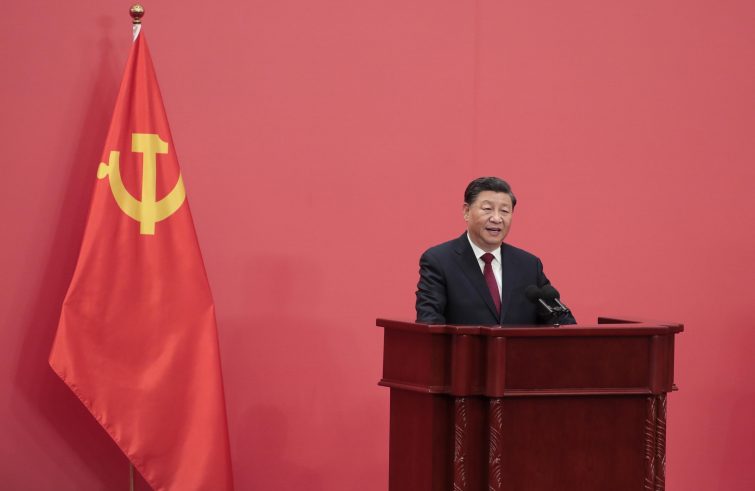
“The extension of Xi Jinping’s rule is essentially no big surprise. Mao Zedong stayed in power for approximately 30 years, and so did Deng Xiaoping. What’s new is the way in which he stays in power. Mao Zedong continued to stay in power as party chairman. Deng Xiaoping was appointed chairman of the military commission. But Xi Jinping is staying in power by changing the rules and by imposing a new system under his sole control. This is no small difference” – said Francesco Sisci, long-time correspondent for several Italian newspapers from Beijing and senior researcher at China People’s University, commenting on Xi Jinping’s re-election for an unprecedented third term as General Secretary of the Chinese Communist Party (CCP), President of the People’s Republic and head of China’s Central Military Commission.
“There was a time when one man did not have centralised power in his own hands and a group of party veterans were in charge,” Sisci remarked. “But according to Xi Jinping, this system had to be changed because it resulted in corruption and chaos in the decision-making process that was no longer manageable. He thus decided to adopt a new form of political leadership.”
Televisions across the globe broadcast footage of former Chinese President Hu Jintao unexpectedly led out of the main auditorium of the Great Hall of the People at the closing ceremony of the Communist Party Congress. What happened?
What has actually happened is quite clear now. Television footage and a series of photos taken shortly before the incident and published by Spanish newspaper ABC show Hu Jintao looking visibly confused. The former president appears about to open a sealed envelope that is kept unopened by those present. The No3 in the Chinese Communist Party tries to stop him politely, but the former doesn’t realise what’s going on. Xi Jinping is seen summoning one of the stewards and Hu Jintao is escorted out of the Hall. The footage is clear and it reveals what actually happened. Now the question is: if they knew – as they did – that Hu Jintao was unwell, why did they allow him to attend the Congress? The short answer is that the Party ‘liturgy’ envisaged the former Party Secretary and State President’s blessing for the new course to begin.
What is he suffering from?
It appears he suffers from advanced Parkinson’s.
So there’s nothing mysterious about the incident?
No, even though we’re talking about China, there’s no mystery. What is yet to be explained is why he was brought there if he was so sick. I assume it was because the old guard’s blessing of the regime’s new direction was needed at all costs.
In short, the perfect show of Xi Jinping’s unchallenged power had to be displayed at the Congress. What has happened in the last few years that brought China to take this particular path?
It’s a process that dates back ten years. It started in 2012, when Xi Jinping took office. Over the years, he gradually concentrated power in his own hands, and today he established a ‘Politburo’ formed by loyalist members.
Why did it happen?
Whether right or wrong, it is explained with the fact that from the late 1990s to 2012, power in China was scattered in thousands of ripples and the decision-making process was engulfed in a process whereby nobody knew who was in charge of making decisions anymore. A widespread and pervasive corruption system came into play to ensure its continuation. Corruption and the dispersion of power were seen as two facets of the same coin, i.e. the government’s utmost inefficiency. In order to solve this problem, Xi Jinping decided to tighten his grip on power and surround himself with a group of loyalists.
Could it be described as a sign of weakness?
It was indeed a long process that started in 2012, not now. Xi Jinping took all the power in his hands because he believed he could fix things. Obviously, if he has been allowed to do so it is because there is broad consensus by his inner circle that things are actually not looking good at all.
To what extent have concerns about Taiwan and Hong Kong played a role?
None at all. As I said, the reasons underlying this new development date back a long time, since 2012. The time frame is much longer.
What will change in terms of international relations?
We do not know. XI Jinping did not delve into the question of international affairs in both his opening and final remarks. In fact he actually ignored the issue in his first speech, while in the closing speech he only made a generic remark about being open to cooperation.
One thing is clear: they realise that they are in great difficulty, because they misjudged a range of issues and opinions and now they feel lost.
What did they get wrong?
They were wrong about Russia, about Ukraine, and even about the United States, which they thought was defeated and collapsing, but is now stronger than before. I don’t know what’s going to happen next. What I do know is that not mentioning international affairs is a sign of difficulties.
Meaning what?
Russia’s future is doomed. And the question is not “if” Russia will succumb, but when. Furthermore, Iran’s Ayatollah’s regime is teetering. It’s almost as if China’s worst nightmare of being besieged by hostile countries were taking shape. China did not see this coming and did not expect it. They made a serious error in judgement. Thus, this misjudgment or miscalculation led to a situation of extreme uncertainty today, one that is objectively fraught with risks.


